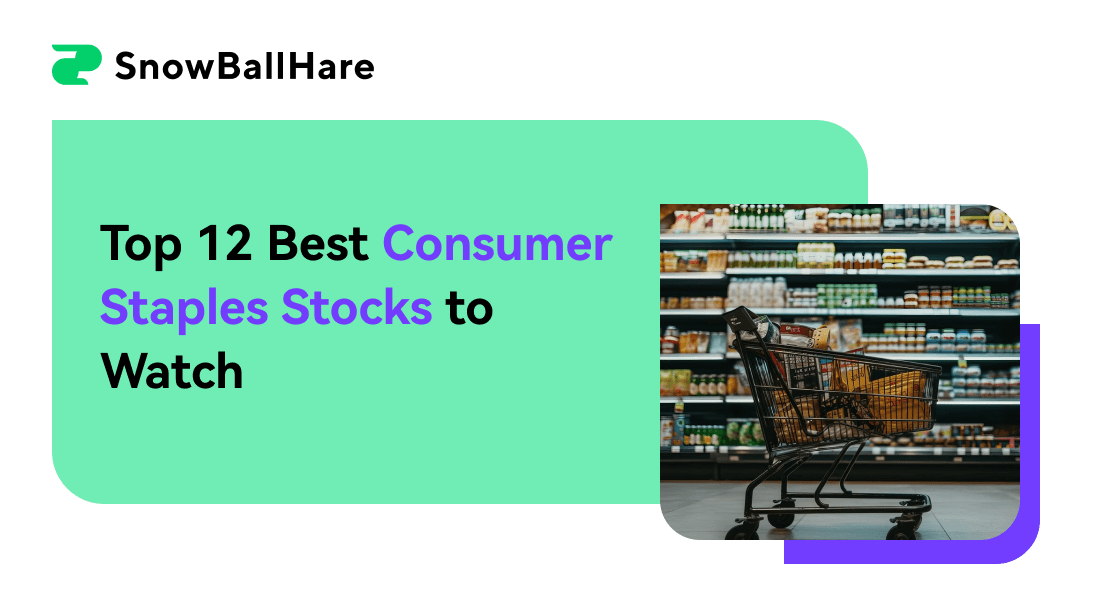● Consumer staples stocks typically offer stable, moderate returns, with companies like Procter & Gamble and Coca-Cola providing annual returns of 7-10% over the past decade, driven by consistent revenue growth and reliable dividends.
● Consumer staple stocks exhibit lower volatility compared to broader markets, with the S&P 500 Consumer Staples Index having a beta of 0.6, meaning they tend to move less dramatically during market fluctuations.
● Consumer staples sector stocks are highly liquid, especially large-cap names like Walmart and PepsiCo, which trade millions of shares daily, ensuring easy entry and exit for investors.
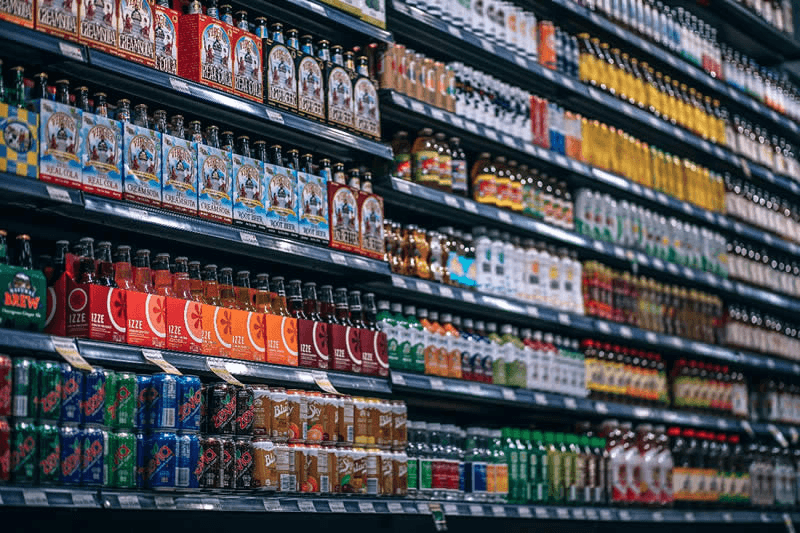
Source: kavout.com
I. What Are Consumer Staples Stocks
Consumer staples stocks represent companies that produce essential goods and services required for daily living, regardless of economic conditions. These companies are typically grouped into categories like:
● Retail (e.g., Walmart, Costco): Offering basic goods such as food, toiletries, and cleaning supplies.
● Food and Beverage (e.g., Coca-Cola): Providing consumables like packaged foods, snacks, and beverages.
● Tobacco (e.g., Philip Morris): Producing products like cigarettes and nicotine-based alternatives.
● Household Items (e.g., Procter & Gamble, Unilever): Manufacturing cleaning products, laundry detergents, and paper towels.
● Personal Care Products (e.g., Colgate-Palmolive, Kimberly-Clark): Making essential health and hygiene items like toothpaste, soaps, and diapers.
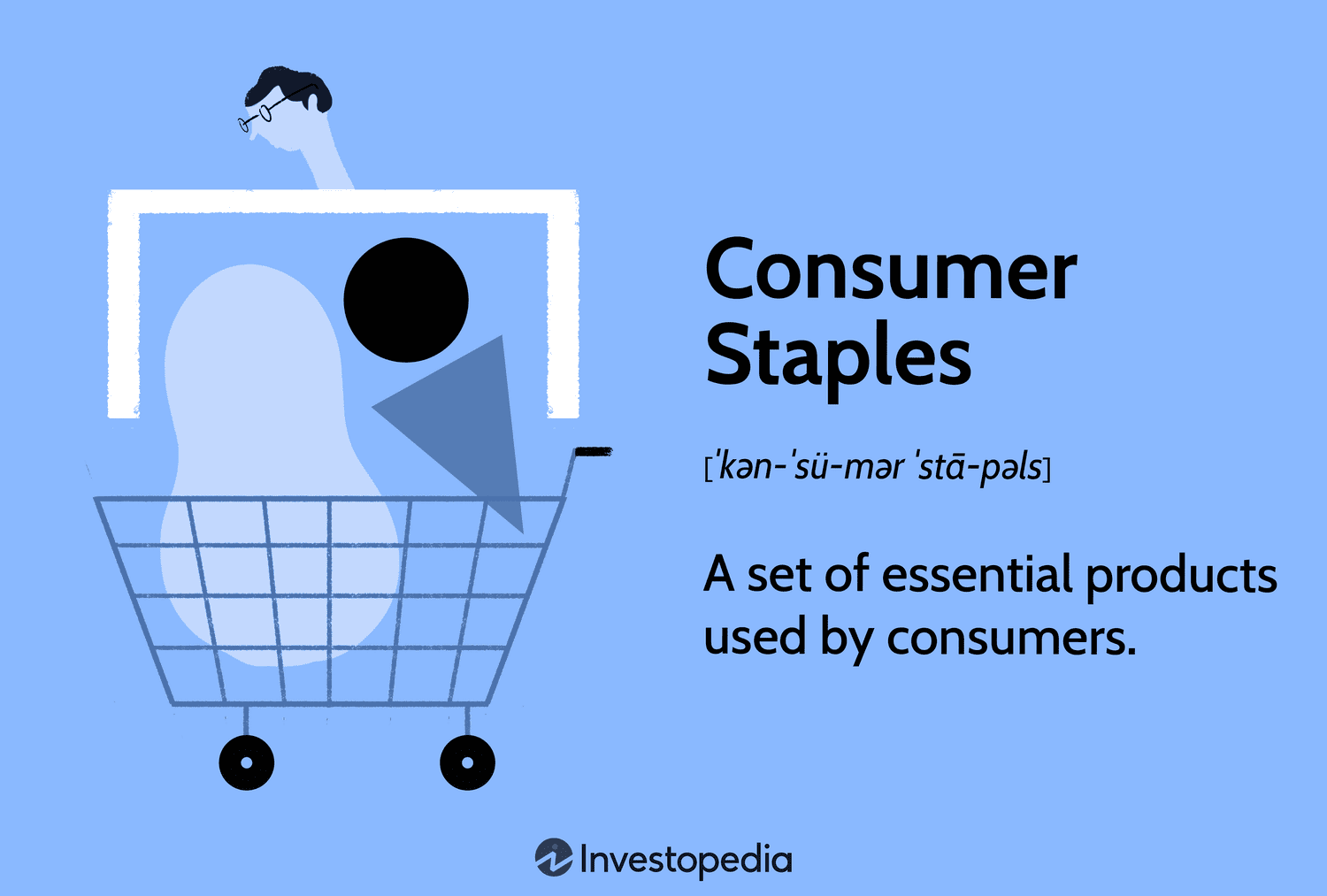
Source: investopedia.com
These products are categorized as "non-cyclical," meaning that their demand remains steady regardless of economic cycles. Whether during a boom or recession, consumers continue to purchase these essential goods.
Why Invest in Consumer Staple Stocks?
Recession-Proof and Consistent Demand:
Consumer staples companies benefit from stable demand in all economic environments. For example, the 2020 pandemic saw Procter & Gamble's revenue rise by 5% year-over-year as people continued to purchase essential items like cleaning supplies.
Steady Growth and Income:
Historically, the consumer staples sector has provided slow but consistent growth. For instance, the S&P 500 Consumer Staples Index grew by 11% in 2022, compared to a 19% decline in the broader S&P 500.
Reliable Dividend Yields:
Many companies in this sector have a long history of paying dividends. Philip Morris, for example, has increased its dividend for over 17 consecutive years, offering stability for income-focused investors.
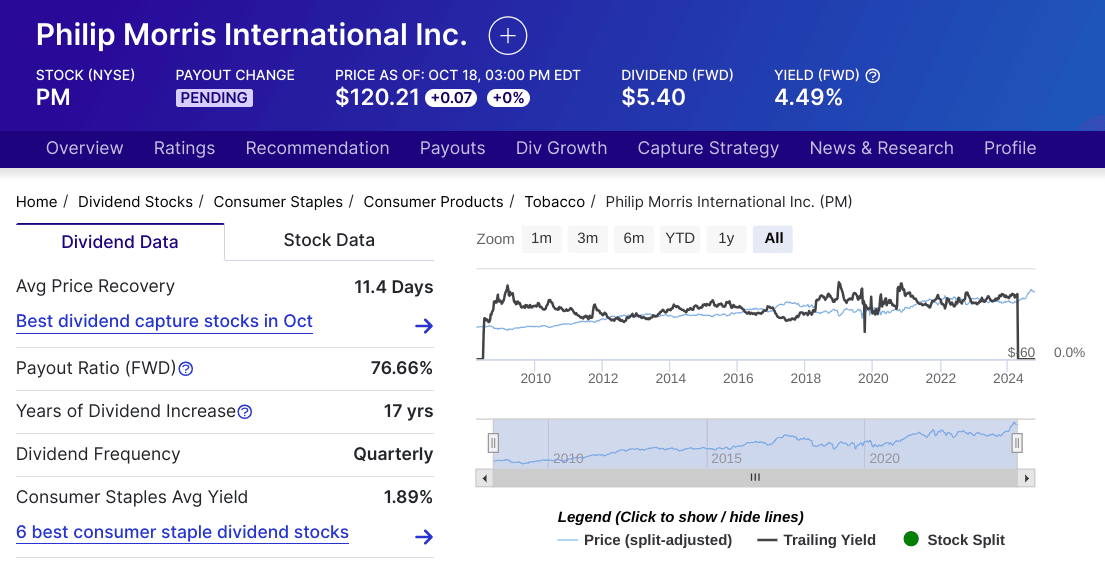
Source: dividend.com
Inflation Hedge:
As producers of essential goods, consumer staples companies can pass on rising costs to consumers during inflationary periods, helping to maintain profit margins.
II. Best Consumer Staples Stocks
Consumer staples stocks are crucial to any diversified portfolio, offering stability, steady income, and growth through economic cycles. Here’s a closer look at 12 key consumer staples companies and 5 ETFs that track the sector.
Procter & Gamble (PG)
Procter & Gamble is a global leader in household products, with iconic brands like Tide, Pampers, Gillette, and Crest. The company operates across multiple segments: beauty, grooming, health care, fabric & home care, and baby/feminine care.
P&G has consistently shown stable revenue growth, reporting Q1 2025 revenue as $21.74 billion, a 2.61% increase from the previous year. It has a long history of dividend increases (66 years consecutively), with a current yield of 2.35%. P&G’s ability to pass on rising costs to consumers during inflationary periods supports its strong pricing power.
Coca-Cola (KO)
Coca-Cola is the world’s largest beverage company, with a portfolio that includes soft drinks, water, and juices. Brands like Coca-Cola, Sprite, and Dasani have global recognition.
Coca-Cola’s robust global presence and diversified product lineup support stable growth. Its revenue for Q2 2024 grew 3.3% to $12.31 billion, fueled by pricing and volume growth. Coca-Cola also offers a solid dividend yield of 2.75% and has increased its dividend for over 60 years. Its focus on product innovation (e.g., healthier beverages) and expansion into new markets promises continued growth.
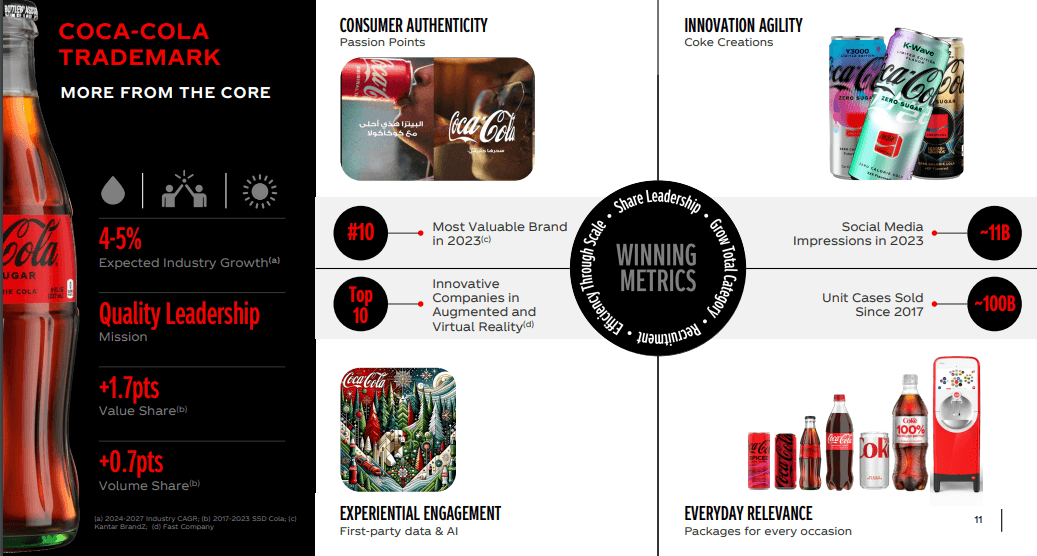
Source: CocaCola Q2 2024 Presentation
PepsiCo (PEP)
PepsiCo competes with Coca-Cola in beverages but also dominates in snacks through brands like Lay’s, Doritos, and Quaker. Its dual focus on food and drinks diversifies its revenue stream.
PepsiCo’s diversified product lineup and leading market position make it a resilient investment. In Q3 2024, PepsiCo reported $23.32 billion in revenue, up 10.4% from the previous year, reflecting strong snack demand. The company offers a 3.1% dividend yield, and its focus on healthier options, sustainability, and international growth should sustain future momentum.
Costco (COST)
Costco operates a global chain of membership-based warehouse stores, offering bulk products at discounted prices. It has a loyal customer base, with over 127 million members as of 2023.
Costco’s revenue grew 1% in Q4 fiscal 2024 to $79.7 billion, driven by strong membership renewals and new store openings. Its business model is resilient in both strong and weak economies, offering investors consistent growth. While its dividend yield is relatively low at 0.52%, Costco’s special dividends and share buybacks add shareholder value.
Walmart (WMT)
Walmart is the world’s largest retailer, with over 10,500 stores worldwide. It offers a wide range of consumer staples, including groceries, household items, and personal care products.
Walmart’s revenue reached $167.77 billion in Q2 FY2025, growing 4.8%. Its massive scale and supply chain efficiency allow it to offer low prices, making it a dominant player in the global retail market. Walmart pays a 1.5% dividend and continues to expand in e-commerce and digital transformation, further boosting its growth prospects.
Unilever (UL)
Unilever is a multinational giant in personal care, food, and home care, with brands like Dove, Lipton, and Axe. It operates in over 190 countries.
Unilever reported $16.67 billion in sales in Q2 2024, with growth driven by price increases and demand in emerging markets. The company’s strong dividend yield of 2.9%, combined with its expansion into sustainable products and digital commerce, provides long-term growth potential.
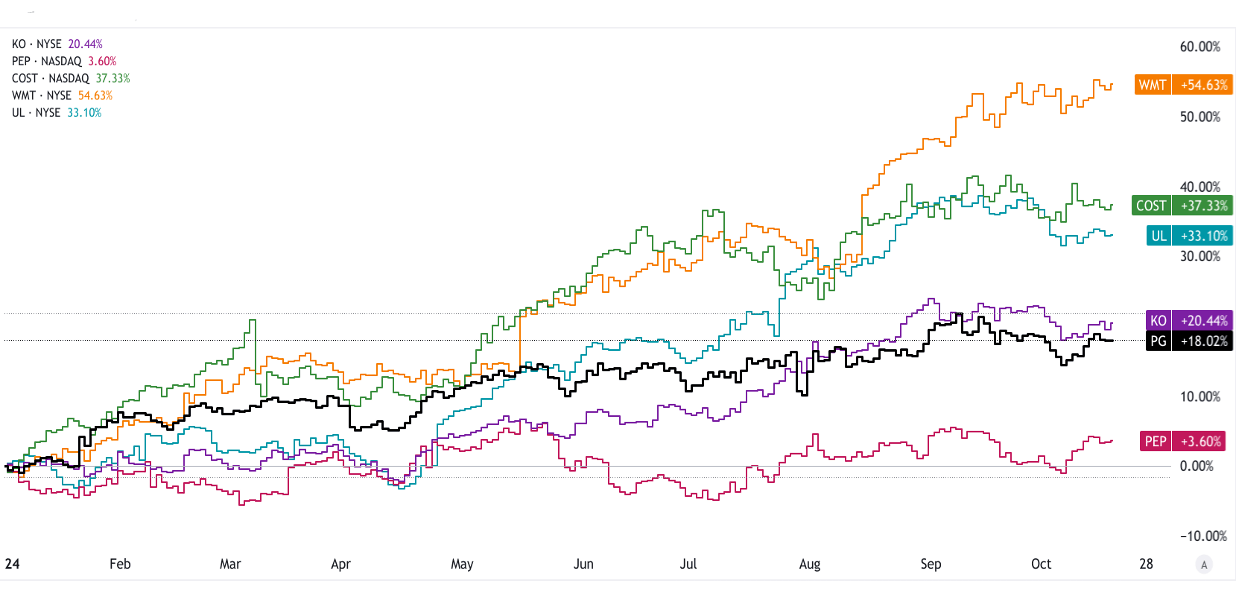
Source: tradingview.com [YTD_Price_Return]
Kimberly-Clark (KMB)
Kimberly-Clark produces essential household and personal care products, including Huggies, Kleenex, and Scott paper towels.
Kimberly-Clark’s revenue for Q2 2024 grew to $5.03 billion, with pricing strategies helping offset higher input costs. The company offers a solid dividend yield of 3.4%, and its consistent cash flow generation ensures dividend stability.
McDonald's (MCD)
McDonald's is the largest global fast-food chain, serving over 69 million customers daily in more than 100 countries.
McDonald’s reported $6.49 billion in revenue in Q2 2024. It has a 2.2% dividend yield and focuses on digitalization and expanding its delivery services to boost future growth.
Starbucks (SBUX)
Starbucks is a global leader in specialty coffee, with more than 36,000 stores worldwide.
Starbucks’ revenue in Q3 2024 was $9.1 billion, flat year-over-year, driven by new store openings and strong demand in international markets, especially China. With a 2.4% dividend yield, Starbucks continues to invest in technology and innovation to enhance customer experience and long-term growth.
Philip Morris International (PM)
Philip Morris is a leading tobacco company, with well-known brands like Marlboro and its IQOS smoke-free products.
Philip Morris’ revenue for Q2 2024 reached $9.47 billion, up 5.6%, with strong demand for reduced-risk products. It offers a high dividend yield of 4.49%, making it attractive to income investors, and its shift to reduced-risk alternatives ensures future growth.
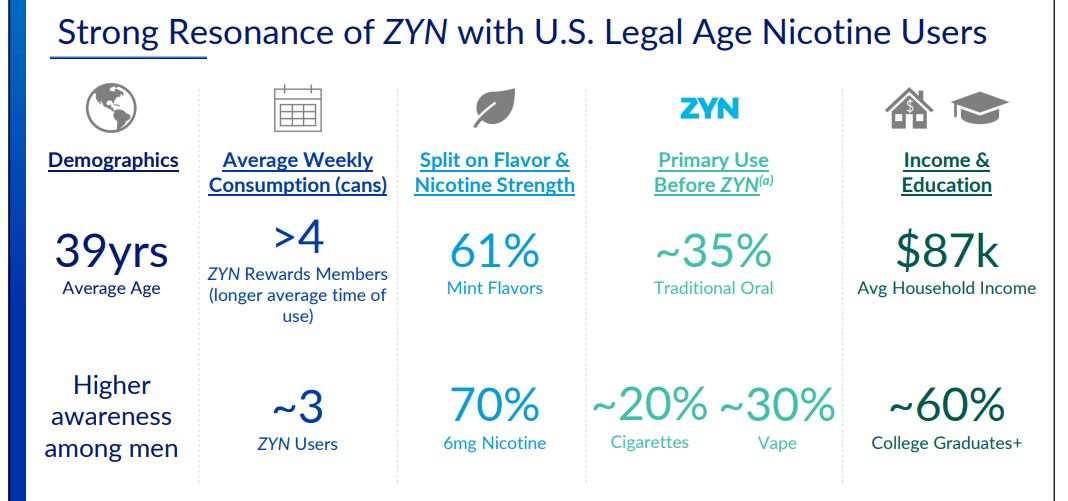
Source: PMI U.S. Management Team
Colgate-Palmolive (CL)
Colgate-Palmolive specializes in oral care, personal care, and pet nutrition, with flagship brands like Colgate and Palmolive.
Colgate’s revenue grew to $5.06 billion (+4.9% YoY) in Q2 2024, supported by strong global demand for essential hygiene products. With a 2% dividend yield and continued investment in product innovation, it’s positioned for stable growth.
Nestlé (NSRGY)
Nestlé is the largest food and beverage company globally, with brands like Nescafé, KitKat, and Gerber.
Nestlé generated $25.18 billion in revenue in Q2 2024 driven by strong sales in coffee and pet care. The company’s dividend yield of 3.3% and its commitment to sustainable products make it a solid long-term investment.
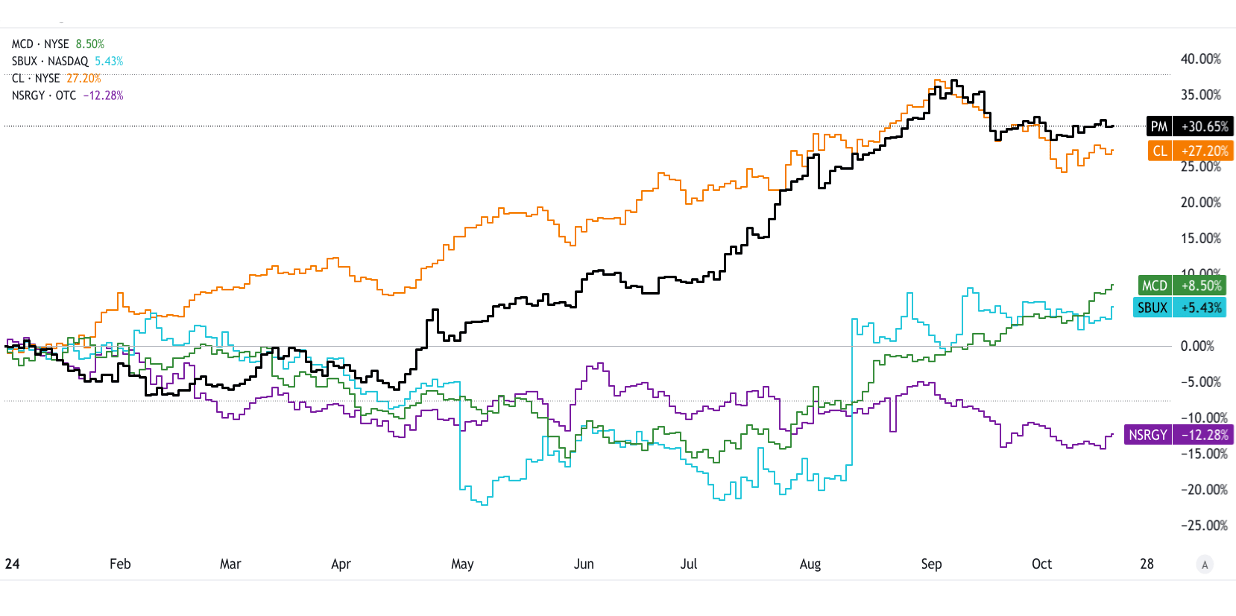
Source: tradingview.com [YTD_Price_Return]
Best Consumer Staples ETFs
Consumer Staples Select Sector SPDR Fund (XLP)
XLP is the largest consumer staples ETF, with over $17.33 billion in assets. It tracks the S&P Consumer Staples Select Sector Index, with major holdings in Procter & Gamble, Coca-Cola, and PepsiCo.
XLP provides diversified exposure to the leading consumer staples companies, offering investors stability and a dividend yield of around 2.57%.
Vanguard Consumer Staples ETF (VDC)
VDC has over $8.58 billion in assets and tracks the MSCI US Investable Market Consumer Staples 25/50 Index, holding large positions in Procter & Gamble, PepsiCo, and Walmart.
VDC offers a broad exposure to the consumer staples sector, with a lower expense ratio (0.10%) and a dividend yield of 2.54%.
iShares U.S. Consumer Staples ETF (IYK)
IYK holds around $1.34 billion in assets, with top holdings in Procter & Gamble, Coca-Cola, and PepsiCo.
With a similar exposure to leading U.S. staples stocks, IYK provides a 2.48% dividend yield and consistent performance.
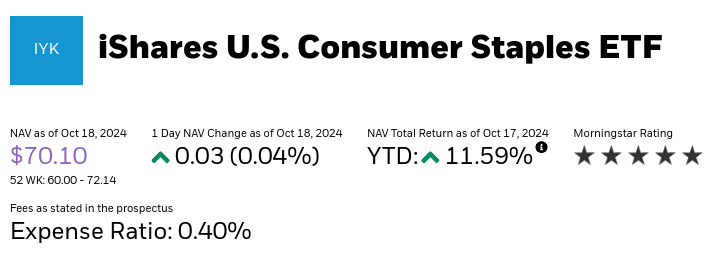
Source: ishares.com
Fidelity MSCI Consumer Staples Index ETF (FSTA)
FSTA has $1.22 billion in assets and a broad exposure to U.S. staples companies.
FSTA’s expense ratio is very low at 0.08%, making it a cost-effective choice for investors looking for stable dividend yields (2.38%) and sector exposure.
iShares Global Consumer Staples ETF (KXI)
KXI offers global exposure, with holdings in U.S. giants like Procter & Gamble, as well as international names like Nestlé and Unilever.
KXI provides a 2.8% dividend yield and is ideal for investors seeking diversified global staples exposure.
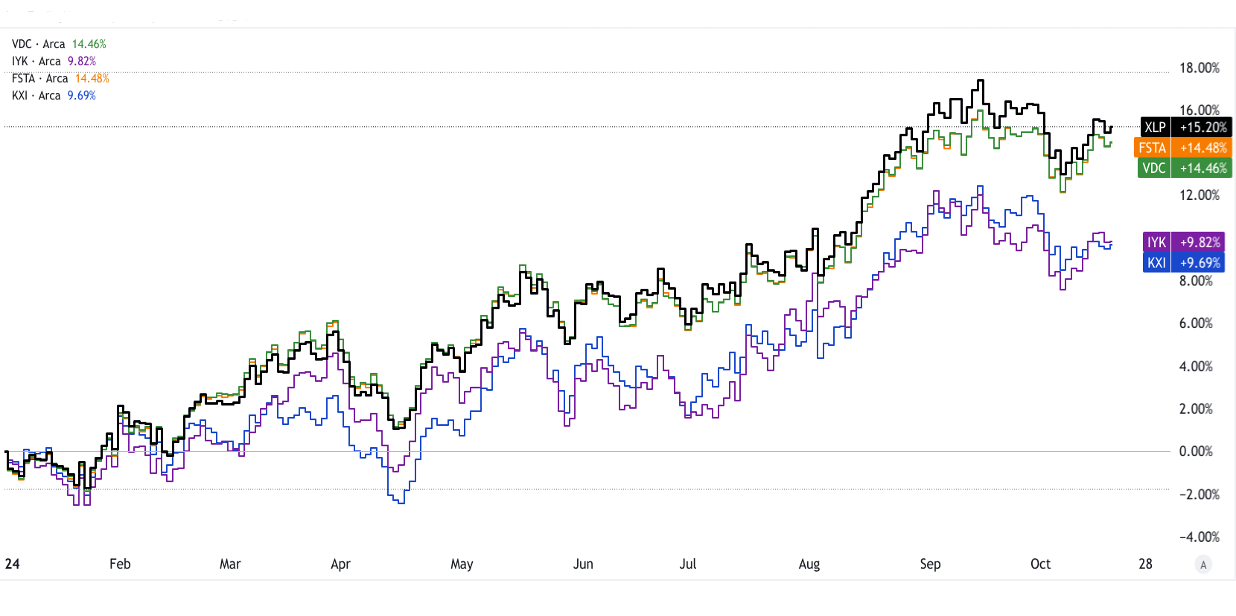
Source: tradingview.com [YTD_Price_Return]
III. Factors to Consider When Investing in Consumer Staples Stocks
Economic Cycles and Consumer Trends:
Consumer staples stocks are generally less affected by economic downturns due to the inelastic demand for essential products. However, shifts in consumer behavior, like increasing demand for healthier or sustainable options, can impact individual companies. For instance, Unilever and Nestlé have pivoted toward eco-friendly and organic products to cater to evolving trends. In 2023, Nestlé’s revenue grew 7.8%, supported by demand for sustainable goods.
Company Financial Health & Dividend History:
Stability is key. Investors should evaluate a company’s balance sheet, free cash flow, and debt levels. Strong dividend histories indicate reliability; for example, CocaCola has increased its dividend for 63 consecutive years. It’s also important to monitor payout ratios—CocaCola’s is 64%—which reflect the sustainability of dividends.
Brand Strength & Economic Moat:
A robust brand creates a competitive advantage, or "economic moat," allowing companies to maintain pricing power and market share. Coca-Cola’s global brand recognition has helped it sustain a ~3% dividend yield while fending off competition. Similarly, companies like McDonald’s and Walmart leverage their scale and brand loyalty to retain customers.
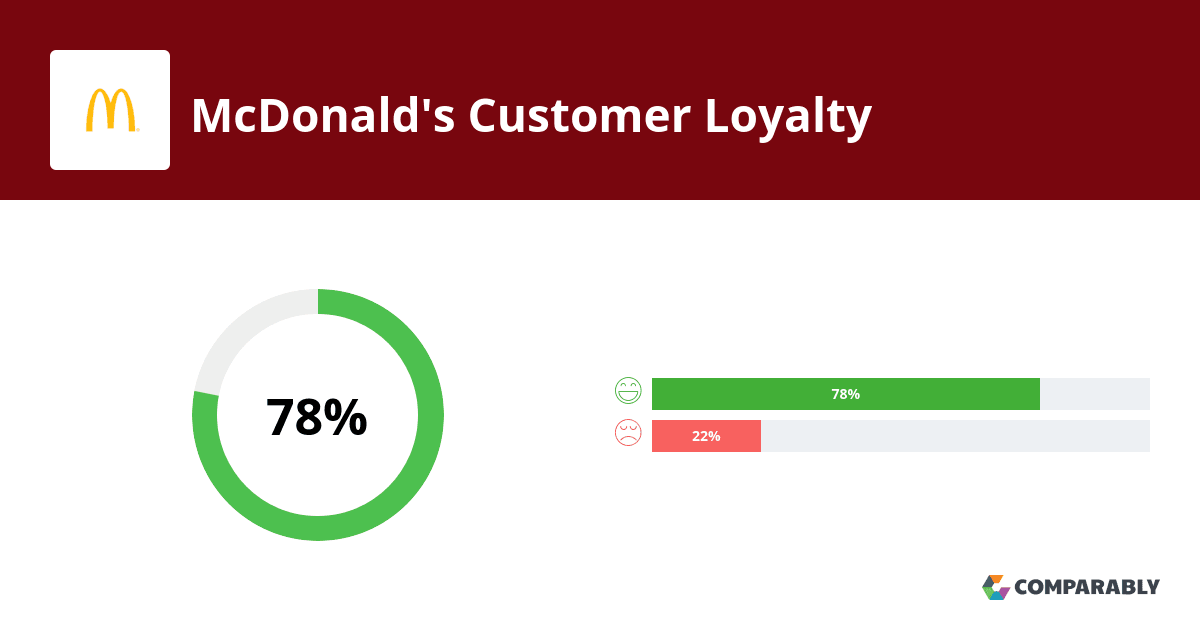
Source: comparably.com
Product Diversification:
Diversified product portfolios help reduce risk. PepsiCo, with its mix of beverages and snacks, mitigates risks tied to any single product segment. In 2020-2023, PepsiCo’s snack business outpaced its beverages, gaining more than 2% points of value share.
Regulatory Changes, Supply Chain Disruptions, Currency Risks:
Regulatory changes, such as tobacco legislation, can impact companies like Philip Morris. Global supply chain disruptions, like those seen in 2021, affect costs and operations. Additionally, currency fluctuations can impact revenue for multinational companies like Unilever.
IV. Consumer Staples Sector Trends and Consumer Staples Stocks Outlook
The global consumer staples market was valued at approximately $10.7 trillion in 2023, with growth projected at a 4.8% compound annual growth rate (CAGR) through 2028. North America and Europe currently dominate, but emerging markets in Asia and Latin America are poised for faster growth due to rising disposable incomes and urbanization. For instance, companies like Nestlé are investing heavily in India and China, with Nestlé reporting 18% sales growth in China in FY2023.
Future Trends
Sustainability & ESG:
Environmental, Social, and Governance (ESG) practices are reshaping the sector. Companies like Unilever and Procter & Gamble are increasingly focused on reducing carbon footprints and sourcing sustainable materials. Unilever, for example, has committed to halving the use of virgin plastic by 2025, positioning it for long-term investor appeal as consumers prioritize eco-friendly brands.
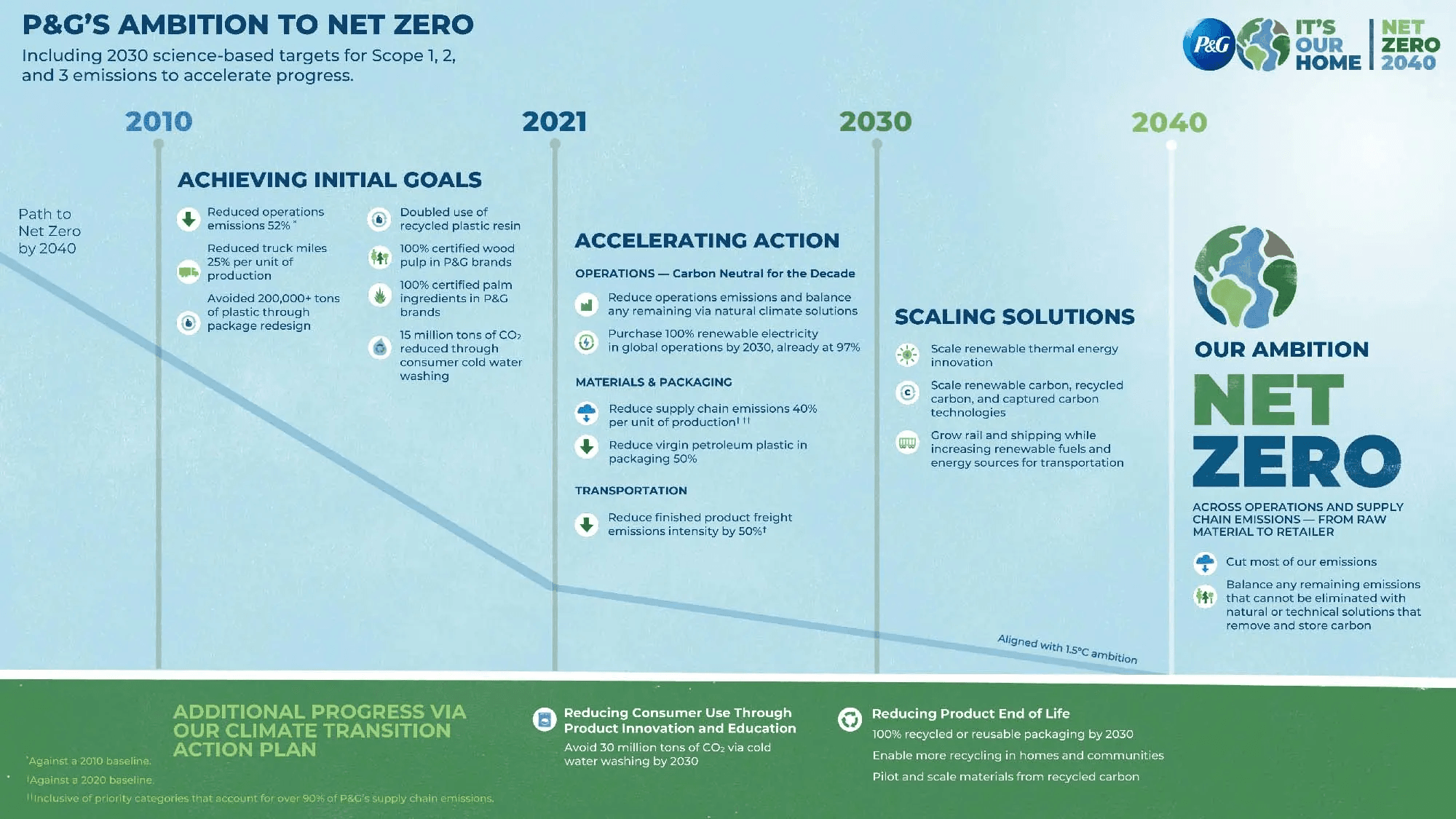
Source: Investor Relations PG
Health & Wellness Focus:
Shifting consumer preferences towards healthier options are driving innovation. PepsiCo's pivot to healthier snacks and beverages resulted in a 15% revenue growth in its "better-for-you" product category in 2023. This trend will likely accelerate, with companies focusing on low-sugar, organic, and plant-based products.
Private Label Competition & Shrinkflation:
Rising inflation has spurred demand for cheaper, private-label alternatives from retailers like Walmart and Costco. Additionally, shrinkflation (reducing product size without lowering price) has become a tactic to offset rising input costs, though it risks eroding brand loyalty.
Long-Term Outlook
Emerging Market Growth:
Companies like Coca-Cola and Colgate-Palmolive will benefit from emerging markets, where increased consumer spending and population growth offer robust long-term potential.
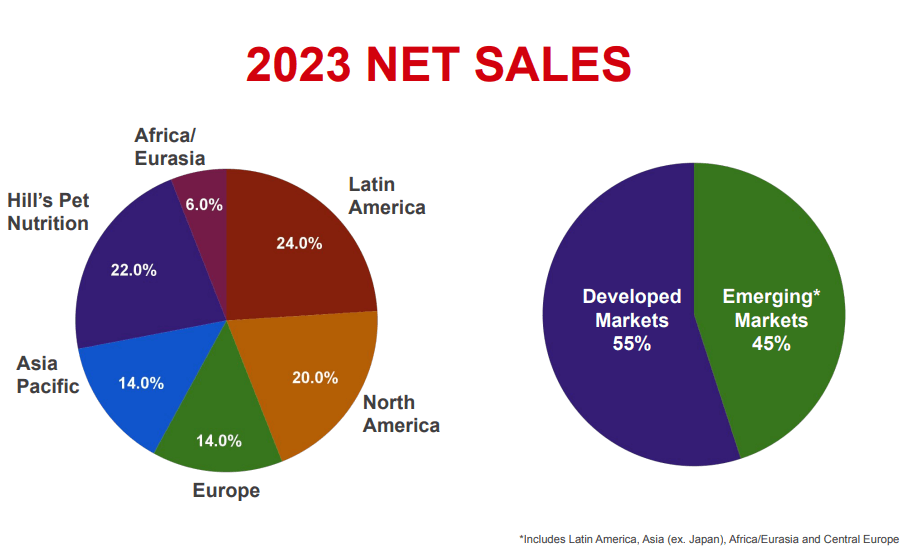
Source: investor.colgatepalmolive.com
Sustainability & Innovation:
Sustainability initiatives and innovations in packaging, product development, and digital transformation will drive future growth. The focus on ESG, health-conscious offerings, and efficiency gains makes consumer staples stocks a strong long-term play.
*Disclaimer: The content of this article is for learning purposes only and does not represent the official position of SnowBallHare, nor can it be used as investment advice.
